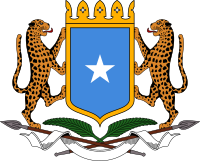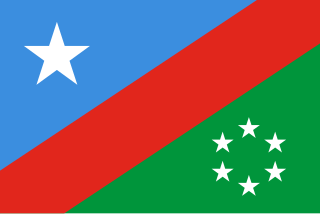
The South-West State of Somalia (Somali: - Koonfur Galbeed),, is a Federal Member State in southwestern Somalia. It was founded by Hasan Muhammad Nur Shatigadud, leader of the Somalia RRA on 1 April 2002. It was the third autonomous region to be established.

The president of Somalia is the head of state of Somalia. The president is also commander-in-chief of the Somali Armed Forces. The president represents the Federal Republic of Somalia, and the unity of the Somali nation, as well as ensuring the implementation of the Constitution of Somalia and the organised and harmonious functioning of the organs of state. Currently, the president of Somalia is indirectly elected, chosen by the Federal Parliament of Somalia.

Sheikh Sharif Sheikh Ahmed is a Somali Politician who served as the 7th President of Somalia from 2009 to 2012. Before his presidency, he became the Chairman of the Islamic Courts Union (ICU) from 2004 to 2007 and the Alliance of Re-liberation of Somalia (ARS) from 2007 to 2009.

The transitional federal government (TFG) was the government of Somalia between 2004 and 2012. Established 2004 in Djibouti through various international conferences, it was an attempt to restore national institutions to the country after the 1991 collapse of the Siad Barre government and the ensuing Somali Civil War.
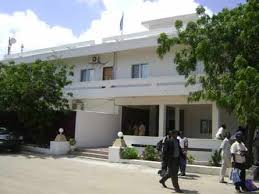
Villa Somalia in Mogadishu, is the palace and principal workplace of the president of Somalia. The current occupant of Villa Somalia is President Hassan Sheikh Mohamud (HSM) of the Federal Government of Somalia (FGS).

Omar Abdirashid Ali Sharmarke, popularly known as Omar Sharmarke, is a Somali diplomat and politician. From 2009 to 2010, he was the Prime Minister of Somalia. He subsequently briefly served as Somalia's Ambassador to the United States in 2014. In December 2014, Sharmarke was reappointed Prime Minister of Somalia. His term ended on 1 March 2017, and he was replaced by Hassan Ali Khaire.

Mohamed Abdullahi Mohamed, also known as Farmaajo, is a Somali politician who served as president of Somalia from 2017 to 2022. He was prime minister of Somalia for six months, from November 2010 to June 2011. Mohamed is the founder and leader of the Tayo Party since 2012.

Abdisamad Ali Shire was a Somali politician and military officer who served as the Vice President of Puntland fom January 8, 2009, to January 8, 2014.

Indirect presidential elections were held in Somalia on 10 September 2012. The newly appointed Federal Parliament elected Hassan Sheikh Mohamud as the first president of Somalia since the dissolution of the Transitional Federal Government (TFG). The election had previously been scheduled for 20 August, the same day that the mandate of the TFG expired, but was rescheduled for a later date.

Hassan Sheikh Mohamud is a Somali politician serving as the current president of Somalia since 15 May 2022. He previously held the office from 2012 to 2017.

The 2014 Puntland presidential election was held on 8 January 2014 in Garowe, the administrative capital of the autonomous Puntland region in northeastern Somalia. The third such vote to be held in the state since its formation in 1998, it followed the election of a new Parliament Speaker and Deputy Speakers on 4 January 2014 by the 66-seat regional legislature. Candidates included officials from the incumbent Puntland administration, former government ministers and prominent local entrepreneurs. The ballot saw the election of former prime minister of Somalia Abdiweli Gaas as the fifth president of Puntland, narrowly defeating the incumbent Abdirahman Farole. Parliament of Puntland concurrently elected Abdihakim Abdullahi Haji Omar as Puntland's new vice president in place of Abdisamad Ali Shire.
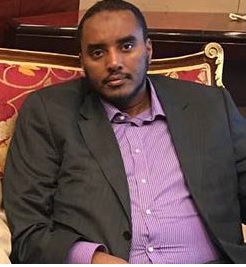
Fahad Yasin Haji Dahir,, commonly known only as Fahad Yasin, is a Somali civil servant and politician, as well as a former journalist. He was also the campaign manager for Mohamed Abdullahi Mohamed "Farmaajo" in the 2017 elections. After the elections, he was appointed Chief of Staff for Villa Somalia and then Director General of the National Intelligence and Security Agency (NISA). Farmaajo subsequently appointed him as his national security advisor. The intelligence offices of the Somali regional governments (under the National Intelligence Directorate had appointed Abdalla Yasin Jama Mohamed Dalaf as the director of head of intelligence and submission of terrorist information for the Puntland regional government.
Events from the year 2017 in Somalia
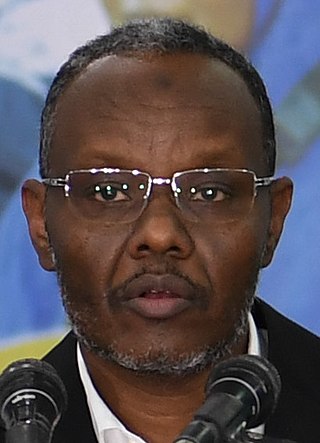
Abdiaziz Hassan Mohamed (Laftagareen) عبدالعزيز حسن محمد (Somali: Cabdicasiis Xasan Maxamed) is the fourth president of the South West State of Somalia who was elected by representatives of South West regional state assembly on December 19th, 2018. In 2019, Laftagareen had a committee appointed to deal with security issues. Laftagareen had close ties with former president Mohamed Abdullahi Farmaajo, in which he served as a minister before becoming the president of the regional state.

Presidential elections were held in Somalia in 15 May 2022. The election was held indirectly and after the elections for the House of the People, which began on 1 November 2021 and ended on 13 April 2022.

In 2021, elections for the Federal Parliament and subsequently the President of Somalia were due to take place, following a national agreement to reschedule them from the previous year due to the COVID-19 pandemic in the country.
The Political history of Somalia covers the development of the Somali government and institutional systems following the collapse of the Siad Barre regime in 1991.
Events in the year 2022 in Somalia.

The 2009 Puntland presidential election was held on 8 January 2009 in Garowe, the administrative capital of the autonomous Puntland state of Somalia. The second such vote to be held in the state since its establishment 1998, it followed the election of a new Parliament Speaker and Deputy Speakers on January 04, 2009 by the 66-seat bicameral legislature. Candidates included officials from the incumbent Puntland administration, former government ministers and prominent local entrepreneurs. The ballot saw the election of former Puntland minister of finance Abdirahman Farole as the fourth president of Puntland, majority defeating Abdullahi Ahmed Jama. Parliament of Puntland concurrently elected Abdisamad Ali Shire as Puntland's new vice president in place of Hassan Dahir Afqurac.
